#Debt-Collection
Explore tagged Tumblr posts
Text
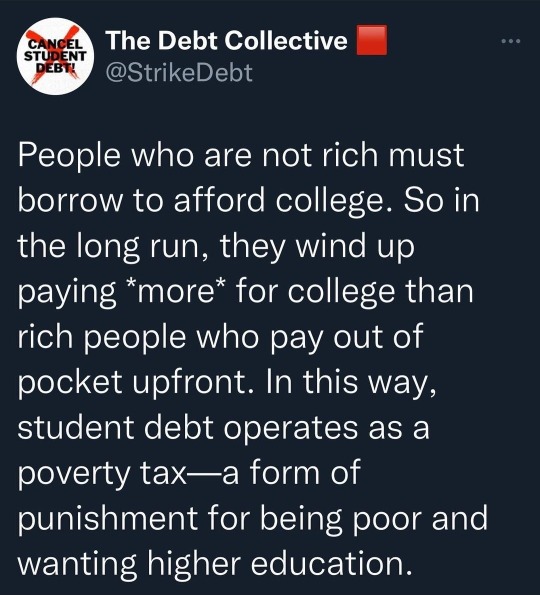

35K notes
·
View notes
Text
DpxDc Being a Green Lantern’s ghost is quite different from being one in life.
When a Green Lantern falls, their ring leaves the body. Some souls find paradise, but others remain obsessively bound to their Green Lantern duty, even in death.
The Infinite Realms are bast, so much so that it's rare to encounter a Green Lantern. Thus, they arrive too late to witness Phantom’s battle with the Tyrant King, only catching the moment he is sent to his final rest.
Some of the Green Lanterns still remember the reign of Pariah Dark. Unable to confront him directly, they turned their duty toward relocating ghosts, hiding those the Tyrant King wished to erase.
But being a Green Lantern’s ghost is quite different from being one in life. They can feel the new king’s core, a primordial need for protection and space. It feels like home.
There is no Oa, but there is King Phantom. And if he asks, they will serve.
Until the living world wounds the king in his human form. There is no way to kill him before his time, but he can… had been hurt. And as he sleeps, the realms scream for war.
Earth is under siege. The skeleton army forms a ring around the planet, awaiting the ancients command. Who, out of kindness for the king’s love of Earth, gives mortals a warning: destroy the GIW, or perish.
It’s chaos. The ancients does not appear in their usual form. They are titans to those who look up to the sky.
The Green Lanterns don’t stay to see more. They fly to Oa, because the ancients power of destruction will not stop with Earth.
#dp x dc#dc x dp#king phantom#danny phantom#green lantern#promt#Danny was happy to meet a whole order of aliens#vivisection? maybe#Totally wanted to see ancients ghosts as big like a celestial#Like... America's gov fuck whith who?#that calls The Justice Leagues ignored? about to collect their debt#dp x dc crossover#dp x dc prompt#dp x dc fanfic#dc x dp crossover#dc x dp prompt#danny phantom x dc
698 notes
·
View notes
Text
Paying consumer debts is basically optional in the United States
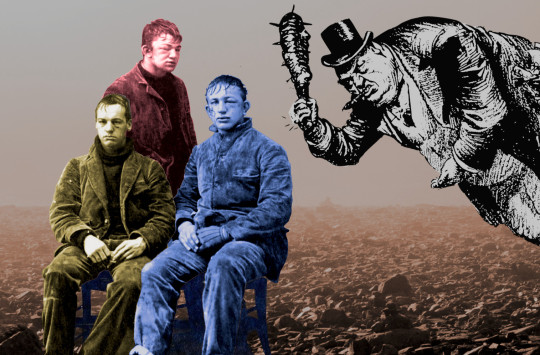
The vast majority of America's debt collection targets $500-2,000 credit card debts. It is a filthy business, operated by lawless firms who hire unskilled workers drawn from the same economic background as their targets, who routinely and grotesquely flout the law, but only when it comes to the people with the least ability to pay.
America has fairly robust laws to protect debtors from sleazy debt-collection practices, notably the Fair Debt Collection Practices Act (FDCPA), which has been on the books since 1978. The FDCPA puts strict limits on the conduct of debt collectors, and offers real remedies to debtors when they are abused.
But for FDPCA provisions to be honored, they must be understood. The people who collect these debts are almost entirely untrained. The people they collected the debts from are likewise in the dark. The only specialized expertise debt-collection firms concern themselves with are a series of gotcha tricks and semi-automated legal shenanigans that let them take money they don't deserve from people who can't afford to pay it.
There's no better person to explain this dynamic than Patrick McKenzie, a finance and technology expert whose Bits About Money newsletter is absolutely essential reading. No one breaks down the internal operations of the finance sector like McKenzie. His latest edition, "Credit card debt collection," is a fantastic read:
https://www.bitsaboutmoney.com/archive/the-waste-stream-of-consumer-finance/
McKenzie describes how a debt collector who mistook him for a different PJ McKenzie and tried to shake him down for a couple hundred bucks, and how this launched him into a life as a volunteer advocate for debtors who were less equipped to defend themselves from collectors than he was.
McKenzie's conclusion is that "paying consumer debts is basically optional in the United States." If you stand on your rights (which requires that you know your rights), then you will quickly discover that debt collectors don't have – and can't get – the documentation needed to collect on whatever debts they think you owe (even if you really owe them).
The credit card companies are fully aware of this, and bank (literally) on the fact that "the vast majority of consumers, including those with the socioeconomic wherewithal to walk away from their debts, feel themselves morally bound and pay as agreed."
If you find yourself on the business end of a debt collector's harassment campaign, you can generally make it end simply by "carefully sending a series of letters invoking [your] rights under the FDCPA." The debt collector who receives these letters will have bought your debt at five cents on the dollar, and will simply write it off.
By contrast, the mere act of paying anything marks you out as substantially more likely to pay than nearly everyone else on their hit-list. Paying anything doesn't trigger forbearance, it invites a flood of harassing calls and letters, because you've demonstrated that you can be coerced into paying.
But while learning FDCPA rules isn't overly difficult, it's also beyond the wherewithal of the most distressed debtors (and people falsely accused of being debtors). McKenzie recounts that many of the people he helped were living under chaotic circumstances that put seemingly simple things "like writing letters and counting to 30 days" beyond their needs.
This means that the people best able to defend themselves against illegal shakedowns are less likely to be targeted. Instead, debt collectors husband their resources so they can use them "to do abusive and frequently illegal shakedowns of the people the legislation was meant to benefit."
Here's how this debt market works. If you become delinquent in meeting your credit card payments ("delinquent" has a flexible meaning that varies with each issuer), then your debt will be sold to a collector. It is packaged in part of a large spreadsheet – a CSV file – and likely sold to one of 10 large firms that control 75% of the industry.
The "mom and pops" who have the other quarter of the industry might also get your debt, but it's more likely that they'll buy it as a kind of tailings from one of the big guys, who package up the debts they couldn't collect on and sell them at even deeper discounts.
The people who make the calls are often barely better off than the people they're calling. They're minimally trained and required to work at a breakneck pace. Employee turnover is 75-100% annually: imagine the worst call center job in the world, and then make it worse, and make "success" into a moral injury, and you've got the debt-collector rank-and-file.
To improve the yield on this awful process, debt collection companies start by purging these spreadsheets of likely duds: dead people, people with very low credit-scores, and people who appear on a list of debtors who know their rights and are likely to stand on them (that's right, merely insisting on your rights can ensure that the entire debt-collection industry leaves you alone, forever).
The FDPCA gives you rights: for example, you have the right to verify the debt and see the contract you signed when you took it on. The debt collector who calls you almost certainly does not have that contract and can't get it. Your original lender might, but they stopped caring about your debt the minute they sold it to a debt-collector. Their own IT systems are baling-wire-and-spit Rube Goldberg machines that glue together the wheezing computers of all the companies they've bought over the last 25 years. Retrieving your paperwork is a nontrivial task, and the lender doesn't have any reason to perform it.
Debt collectors are bottom feeders. They are buying delinquent debts at 5 cents on the dollar and hoping to recover 8 percent of them; at 7 percent, they're losing money. They aren't "large, nationally scaled, hypercompetent operators" – they're shoestring operations that can only be viable if they hire unskilled workers and fail to train them.
They are subject to automatic damages for illegal behavior, but they still break the law all the time. As McKenzie writes, a debt collector will "commit three federal torts in a few minutes of talking to a debtor then follow up with a confirmation of the same in writing." A statement like "if you don’t pay me I will sue you and then Immigration will take notice of that and yank your green card" makes the requisite three violations: a false threat of legal action, a false statement of affiliation with a federal agency, and "a false alleged consequence for debt nonpayment not provided for in law."
If you know this, you can likely end the process right there. If you don't, buckle in. The one area that debt collectors invest heavily in is the automation that allows them to engage in high-intensity harassment. They use "predictive dialers" to make multiple calls at once, only connecting the collector to the calls that pick up. They will call you repeatedly. They'll call your family, something they're legally prohibited from doing except to get your contact info, but they'll do it anyway, betting that you'll scrape up $250 to keep them from harassing your mother.
These dialing systems are far better organized than any of the company's record keeping about what you owe. A company may sell your debt on and fail to keep track of it, with the effect that multiple collectors will call you about the same debt, and even paying off one of them will not stop the other.
Talking to these people is a bad idea, because the one area where collectors get sophisticated training is in emptying your bank account. If you consent to a "payment plan," they will use your account and routing info to start whacking your bank account, and your bank will let them do it, because the one part of your conversation they reliably record is this payment plan rigamarole. Sending a check won't help – they'll use the account info on the front of your check to undertake "demand debits" from your account, and backstop it with that recorded call.
Any agreement on your part to get on a payment plan transforms the old, low-value debt you incurred with your credit card into a brand new, high value debt that you owe to the bill collector. There's a good chance they'll sell this debt to another collector and take the lump sum – and then the new collector will commence a fresh round of harassment.
McKenzie says you should never talk to a debt collector. Make them put everything in writing. They are almost certain to lie to you and violate your rights, and a written record will help you prove it later. What's more, debt collection agencies just don't have the capacity or competence to engage in written correspondence. Tell them to put it in writing and there's a good chance they'll just give up and move on, hunting softer targets.
One other thing debt collectors due is robo-sue their targets, bulk-filing boilerplate suits against debtors, real and imaginary. If you don't show up for court (which is what usually happens), they'll get a default judgment, and with it, the legal right to raid your bank account and your paycheck. That, in turn, is an asset that, once again, the debt collector can sell to an even scummier bottom-feeder, pocketing a lump sum.
McKenzie doesn't know what will fix this. But Michael Hudson, a renowned scholar of the debt practices of antiquity, has some ideas. Hudson has written eloquently and persuasively about the longstanding practice of jubilee, in which all debts were periodically wiped clean (say, whenever a new king took the throne, or once per generation):
https://pluralistic.net/2020/03/24/grandparents-optional-party/#jubilee
Hudson's core maxim is that "debt's that can't be paid won't be paid." The productive economy will have need for credit to secure the inputs to their processes. Farmers need to borrow every year for labor, seed and fertilizer. If all goes according to plan, the producer pays off the lender after the production is done and the goods are sold.
But even the most competent producer will eventually find themselves unable to pay. The best-prepared farmer can't save every harvest from blight, hailstorms or fire. When the producer can't pay the creditor, they go a little deeper into debt. That debt accumulates, getting worse with interest and with each bad beat.
Run this process long enough and the entire productive economy will be captive to lenders, who will be able to direct production for follies and fripperies. Farmers stop producing the food the people need so they can devote their land to ornamental flowers for creditors' tables. Left to themselves, credit markets produce hereditary castes of lenders and debtors, with lenders exercising ever-more power over debtors.
This is socially destabilizing; you can feel it in McKenzie's eloquent, barely controlled rage at the hopeless structural knot that produces the abusive and predatory debt industry. Hudson's claim is that the rulers of antiquity knew this – and that we forgot it. Jubilee was key to producing long term political stability. Take away Jubilee and civilizations collapse:
https://pluralistic.net/2022/07/08/jubilant/#construire-des-passerelles
Debts that can't be paid won't be paid. Debt collectors know this. It's irrefutable. The point of debt markets isn't to ensure that debts are discharged – it's to ensure that every penny the hereditary debtor class has is transferred to the creditor class, at the hands of their fellow debtors.
In her 2021 Paris Review article "America's Dead Souls," Molly McGhee gives a haunting, wrenching account of the debts her parents incurred and the harassment they endured:
https://www.theparisreview.org/blog/2021/05/17/americas-dead-souls/
After I published on it, many readers wrote in disbelief, insisting that the debt collection practices McGhee described were illegal:
https://pluralistic.net/2021/05/19/zombie-debt/#damnation
And they are illegal. But debt collection is a trade founded on lawlessness, and its core competence is to identify and target people who can't invoke the law in their own defense.

Going to Defcon this weekend? I’m giving a keynote, “An Audacious Plan to Halt the Internet’s Enshittification and Throw it Into Reverse,” today (Aug 12) at 12:30pm, followed by a book signing at the No Starch Press booth at 2:30pm!
https://info.defcon.org/event/?id=50826

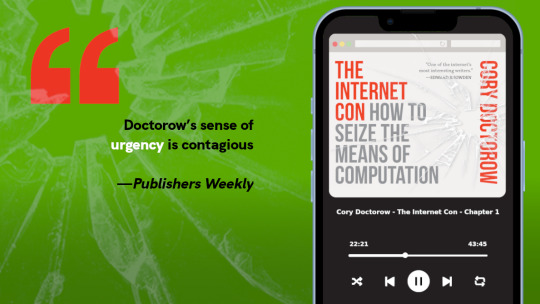
I’m kickstarting the audiobook for “The Internet Con: How To Seize the Means of Computation,” a Big Tech disassembly manual to disenshittify the web and bring back the old, good internet. It’s a DRM-free book, which means Audible won’t carry it, so this crowdfunder is essential. Back now to get the audio, Verso hardcover and ebook:
http://seizethemeansofcomputation.org

If you’d like an essay-formatted version of this post to read or share, here’s a link to it on pluralistic.net, my surveillance-free, ad-free, tracker-free blog:
https://pluralistic.net/2023/08/12/do-not-pay/#fair-debt-collection-practices-act
#pluralistic#jubilee#debts that cant be paid wont be paid#Patrick McKenzie#patio11#bits about money#debt#debt collection#do not pay#bottom feeders#Fair Debt Collection Practices Act#fdcpa#finance#armbreakers
11K notes
·
View notes
Text


The prefect has a day off! Choose what you would like to do: - Visit the mountains with Jade ◀ - Visit people with Floyd
(Featuring @umichipearl's Yuu with Jade)
#my art#twisted wonderland#twst#floyd leech#jade leech#oc#twst yuu#twst mc#twst oc#shiokawa mayu#floyd leech x yuu#floydmayu#jade leech x yuu#pearl#cute hangout ideas!#nothing wrong here!#jade's just happy to share his hobby#floyd's like shrimpy you're free? come with me#just another regular day collecting debt for the lounge#yuu watching like 🧍♀️#this was actually the one thing i wanted to draw today but i got#distracted#working on other pieces#edit: added some colour
1K notes
·
View notes
Text

to the 10 non-israeli hostages still in hamas captivity (listed from top left to bottom right):
bipin joshi, 23, nepal. an agronomy student, bipin arrived at israel to study citrus cultivation, only 3 weeks before 7/10. he was staying at kibbutz alumim when the attack started. at first, when the rockets started, bipin sheltered in a bunker with 16 other nepalese foreigners. thinking this was a "regular" attack, and will pass soon, they've even taken a group selfie, which one of them had uploaded to facebook with the caption "bunker time". bipin can be seen in this photo.
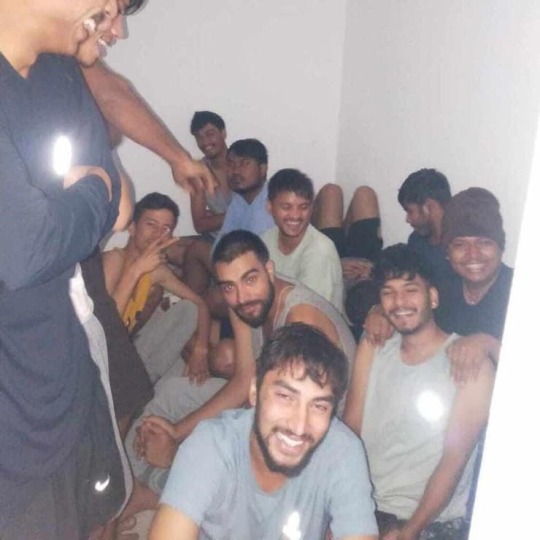
fear settled in when the sound of gunfire was getting closer. terrorists briefly entered the bunker at first, shooting at the men. two were instantly killed - one who was filming with his phone, and one who shouted "we're nepalese!" the terrorists have then started throwing grenades into the bunker. the men have crowded against the wall - except for bipin, who jumped at the grenades to throw them away. he was successful with the first grenade; but the second one exploded before he could get to it, and left several of the men injured and unconscious. the terrorists have moved on from the bunker, and later the men heard distant shouts of israeli officers, who arrived at the active scene of the attack, instructing them to come to a nearby kitchen for better shelter. while a few of the men immediately went there, bipin and a few of his friends tried to first aid those who were injured by the grenade. it was during this time that he quickly texted his cousin, in english: “If something happens to me you have to take care of my family. Be strong and always see the future.” it was then that two terrorists broke into the bunker. one, pointing a gun at the men left inside, instructed them to come outside with him. the other filmed them with his phone - with the footage being the last time bipin was seen. bipin's phone was later located in the gaza strip.
2. sudthisak rinthalak, 43, thailand. a farm worker, he was working the orchards of kibbutz be'eri on the morning of the attack. he was murdered on the spot, and his body kidnapped into the gaza strip. his death was confirmed to his family on may 16, 2024, following an investigation of the available evidence. may he rest in peace.
3. watchara sriaoun, 32, thailand. a farm worker, he was kidnapped from kibbutz nir oz, where he was working. watchara arrived in israel back in 2020 with his brother, in order to cover their family debt and pay their father's medical bills. apart from his mother and brother, waiting for him back home is also watchara's 9 year old daugher, irada, whose mother died in august 2024.
4. sathian suwannakham, 35, thailand. a farm worker from kibbutz nir oz, he arrived at israel in 2020. sathian was seriously injured during his kidnapping. his mother found out about it via a video on facebook; she, alongside sathian's father and sister, are still waiting in thailand for any word on him.
5. pongsak tanna, 36, thailand. a farm worker, he would often livestream while working, talking to his father wilas, or his 14 year old daughter. on the morning of 7/10, pongsak video called his father. during the 10 minute call, he described the chaos of rockets and gunfire, shouting at people around him to hide from the terrorists. eventually the signal was cut. pongsak was kidnapped into the gaza strip. during the weeks after 7/10, wilas spent days riding his bike around his home province, alongside the thailand-cambodia border, looking for anyone with a relative in israel who could help him search for pongsak. he had spent thousands of bahts (hundreds of dollars) repeatedly submitting legal documents to the government, in hope for any news on his son. “if my son is alive, whenever israel can get the hostages released, I want (him) to come home quickly to (his) hometown," silas said in an interview back in october 2024. “most importantly, i want my son to be ordained (as a buddhist monk) for his mom who died when he was away."
6. bannawat seathao, 27, thailand. a farm worker, he was shot in the leg before being kidnapped.
7. nattapong pinta, 35, thailand. nicknamed "nick", nattapong, a farm worker, came to work in israel a year and a half before 7/10, leaving his wife and young son, in order to pay off a debt and help his wife fulfill her dream of opening a coffee shop. he worked the avocado groves in nir oz. during the occasional rocket attacks, nick would call his older sister, reassuring her. "i’m just saving up a little more money, then i’ll be coming back.” on the morning of 7/10, nick called him wife, narissara. there was shooting, he said, and he was running away. that was the last she heard from him. "i felt like my heart was being squeezed when i learned that he hadn't been freed yet," narissara said. "i will definitely go to the airport [when he returns]. nothing will stop me."
8. suntaya akrasi, 20, thailand. a farm worker, suntaya was murdered on 7/10 while working near kibbutz be'eri, then his body was kidnapped into the gaza strip. his death was confirmed on may 16th, 2024. may he rest in peace.
9. joshua loitu mollel, 21, tanzania. an agronomy student, he arrived at israel 3 weeks before 7/10, planning to stay for 11 months. both joshua and his roomate, clemence felix mtenga (22), a fellow student from tanzania, were murdered in nir oz. at first, the pair had managed to text a fellow tanzanian intern in the kibbutz, ezekiel kitiku, telling him that they were running for shelter. but after a few hours, the texts have stopped. joshua's violent kidnapping was filmed and posted online, showing the terrorists stabbing and shooting him several times. joshua's body was kidnapped into the strip; clemence's body was identified a month later. joshua's death was confirmed in december 2023. joshua was the oldest of 5 children, and his stay in israel was his first time traveling outside of tanzania. joshua's father told of joshua's younger siblings that they "ask me every morning and night: ‘Dad, we want to talk to our brother.'" may joshua and clemence rest in peace.
10. surasak lamnau, 30, thailand. a farm worker at first, surasak's mother, kanmee, had no idea what happened to her son. in the chaos following the events of 7/10, his colleagues in israel told her that they did not see him. but after she posted about him online, she was told that he was one of 5 people - an israeli employer and his 4 thai employees - who were kidnapped. his fate is currently unknown.
none of these 10 hostages are expected to be released during the first phase of the ceasefire deal between israel and hamas.
of the 82 foreign nationals who were killed during the 7/10 events, 46 were thai, 10 were nepalese (all agronomy students who were murdered in kibbutz alumim), 5 chinese (3 were murdered in sderot); 4 were from the philippines (3 were working as nurses in the gaza envelope, one was killed in the nova festival massacre); two nurses from sri lanka (both murdered in kibbutz be'eri); two were from tanzania; 2 were from the uk; 2 were from the usa; and the others were from germany, moldova, canada, cambodia, eritrea, india, mexico, ukraine, and geogria. 32 foreign nationals were kidnapped. most of them thai. 647 foreign nationals were injured.
#ישראבלר#jumblr#just spent a few hours collecting information and translating it#foreign victims of 7/10 draw little attention in israel and nearly non at all abroad#and the information isn't consistent. the number of dead ranges between 68-82 in the info i could find#it's infuriating#especially considering how some of the worst and most graphic footage filmed during 7/10 involved foreign workers#and their families... imagine your loved one going abroad to help you pay off a debt or just provide a living#and they get involved in a brutal war they had nothing to do with#and you're half a world away and can do nothing to help them. your government doesn't care. you don't know if they're even alive or dead#i wonder how many of the people who are gonna read this post have had no idea about any of these hostages
373 notes
·
View notes
Text
The reason they are in default is generally poverty and/or disability. People can't afford to pay them back and also have things like housing and electricity and food.
Deliberately destroying the economy for a generation or more for fun and billionaire profit, will throw more people into default.
#Student loans#Loan default#debt collection#Education Department#News#Cruelty is the Point#War on the Poor
157 notes
·
View notes
Text


#debt#clearing debt#philanthropy#value#politics#political#us politics#news#micheal sheen#debt collection#debt collector#capitalism#money
146 notes
·
View notes
Text
orym following dorian’s father “because of how integral the relationships between fathers and sons are to orym and his history and how much he loves dorian,” (bonus: live robbie daymond reaction 👀)









#annemarie watches critical role#critical role#orym of the air ashari#orym#dorian storm#dorian#orym x dorian#dorian x orym#dorym#otp: no debts between us#otp: I just like to see you happy#zeru wyvernwind#robbie daymond#cr cast#bell's hells#collecting legends#c3e105
182 notes
·
View notes
Text
Ngl, that one mf from Kaiju No. 8... him. v




Yeah, fella. Your time is up. I'm coming to collect them dues.
#mhm you're in debt dawg#them loans got your ass#so I gotta collect them cheeks as compensation#smh#q 🦎#leaux needs help#kaiju no. 8#kaijuu 8 gou#soshiro hoshina#reno ichikawa#kn8#kn8 x reader#kn8 spoilers#anime men
152 notes
·
View notes
Text
every time somebody says mel is too kind/sweet/polite/responsible or whatever to wreck a home an angel gains wings because yes that's exactly the point! that's why it's so juicy!!!
mel king with her evergreen kindness and purity of heart has only ever lived for others. she caters to everybody else's whims, schedules time to cry between labs and meetings with the funeral home, tends to graveyards flowers from her parents' grieving relatives, puts her own grief in a box next to her pharmacology textbook and utility bills, seeks to tie every loose end so her sister never feels the pinch of their financial strain and give her a life where she's not swallowed by their joint grief. mel keeps her head up through the worst storms because somebody always needs her attention and care. the woman is a doctor for christ's sake. she heals and has infinite love to give. so she gives it away sparing none for herself.
that is until she starts her 2nd year of residency and latches onto the senior doctor hellbent on teaching her to spare herself the same kindness and care. he spins her around, seeks out her kindness, pays close attention to her, checks in on her every hour, allows her softness to infect him, tells her this place can't operate without the parts of herself she assumed to be counterproductive. he tends to her needs before she can reflexively push them aside.
so for the first time she puts herself first. she shows herself a kindness and takes what she wants. after a lifetime of sacrifice, she has somebody sacrificing himself to please her. the fact that he belongs to someone else is none of her business.
#the universe owes mel a great debt and she's coming to collect <3#she's just being paid in kisses from frank langdon#also this is the show built on subverting tropes and showing u multifaceted characters#the entire thesis of the show is that ur flaws and demons don't make u an evil person. they make u a better human.#so the sweetest girl in the world can in fact be the other woman#mel king#kingdon#langdonmel#the pitt
27 notes
·
View notes
Text

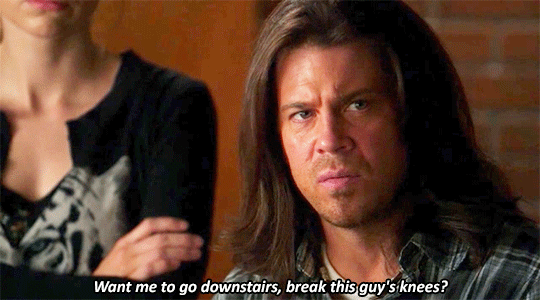

Leverage 2x11 - "The Bottle Job"
#christian kane#leverage#eliot spencer#the bottle job#collecting debts at a wake? unacceptable#breaking knees at a wake? practically encouraged
378 notes
·
View notes
Text
If I had a nickel for every time I had to watch a "Lilly" in a position of power sabotage the lives of promising young men for her own selfish and twisted gains I'd have two nickels—which isn't a lot but it's weird that it happened twice
#i need the universe to collect that karmic debt expeditiously#rae watches#reset#reset the series#the heart killers
16 notes
·
View notes
Note
Pony what’s your opinion on taxes
bad. actually. fuck taxes man. I like to think I understand most things but I don't get taxes man. darry tried to explain em to me one time but I just kept askin what the point of em was n I don't think he had a good answer so he ended up just tellin me to hush up n I could worry about em all I pleased when I had to actually pay em. short answer? the fuck the government need our money for
#the outsiders#ask blog#ponyboy curtis#darry curtis#he gets why LOCAL taxes are important#but when darry tried to explain why the federal government collected taxes for our debts n all pony could NOT get his head around it#'when i ask for money cause i gotta pay up tabs i forgot about at the corner store you say its my fault i ran the tab at all'#'but when the GOVERNMENT spent all our money WE gotta pay uo for that?'#darry only tells him to hush up cause he mostly agrees#n he doesnt wanna admit to that
20 notes
·
View notes
Text
dorian saying “I’m not sure what I have to offer, but I know what my group has to offer. I see it all around us. we are you. scaled down. …all of us come from different places, different backgrounds, and that’s what gives us our strength. we may not be nobles or great religious powers, but we are simply people, capable people set to task. the task we’ve been set to will require one moment of clarity and morality. though none of us might be capable of doing it ourselves, as I do not know that I am, I know that we are. so, if you have trust in this chamber, perhaps you could have trust in us, for we will do the right thing. …we may not look like much, but we have power and we are capable, and so am I. my heart desires to make a difference.” (bonus: orym bluescreening and then taking a deep breath,,, 👀)
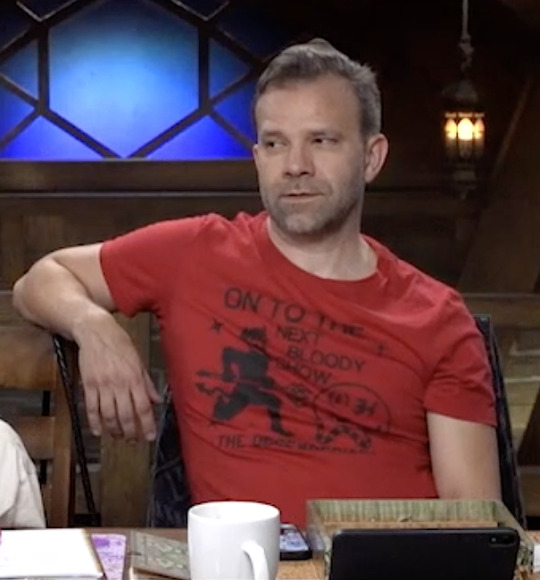


#he is down so bad#annemarie watches critical role#critical role#dorian storm#dorian#orym of the air ashari#orym#dorian x orym#orym x dorian#dorym#otp: no debts between us#otp: I just like to see you happy#bell's hells#collecting legends#c3e105
160 notes
·
View notes
Note
I'm kinda freaking out because apparently a medical bill of mine got sent to a debt collector-- I didn't even know I had to pay this because my parents usually pay my bills and when I asked them they said not to worry about it. (I was 20 then, and I'm still on their insurance so they usually take care of it all). Is this going to ruin my credit? I don't even have any loans or credit so far so this is the only thing that's happened to it. I would have paid if I even knew but they never sent me a letter or an email until the one letting me know about the debt collection. It says I have until the 18th to dispute the debt. I don't really know what to do. Would calling to clear this up and paying right away do anything or am I just screwed?
Call them and pay it. You can and will recover from this! Your credit is going to be fine.
Also... make sure you tell your parents they screwed up. You don't have to be confrontational, just say something like "Hey, did you know about this bill? Because it's in collections now. I've paid it, but in the future, please notify me if you receive any bills for my medical treatment so I can handle it properly without it damaging my credit."
In general, if you can't pay the full amount of a bill, it's best to contact them and pay something. Here's more advice:
How to Pay Hospital Bills When You’re Flat Broke
If you found this helpful, consider joining our Patreon.
151 notes
·
View notes
Text
As a former kpop photocard collector, Infold shouldn’t doubt my ability to drop money for my current emotional support boy and cards with his face. Even if it’s digital…




#omi.rambles#I take the collecting business very serious#I might be in debt but at least I am happy#photocard collection is not for the weak#I wish I was done pulling but I want the outfits#love and deepspace#lads#l&ds#love & deepspace#lads sylus#lads rafayel#omi.ds
35 notes
·
View notes